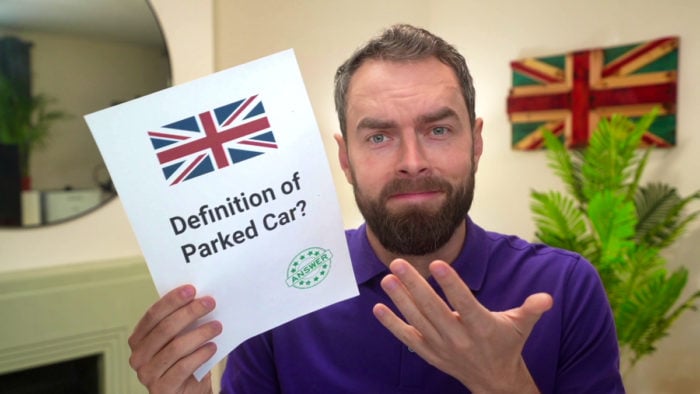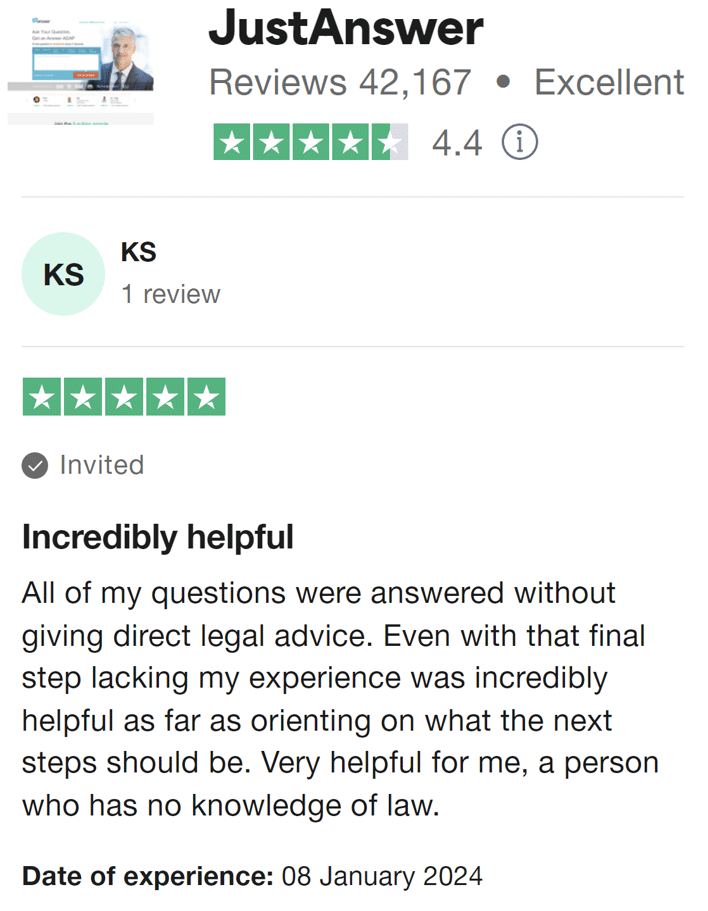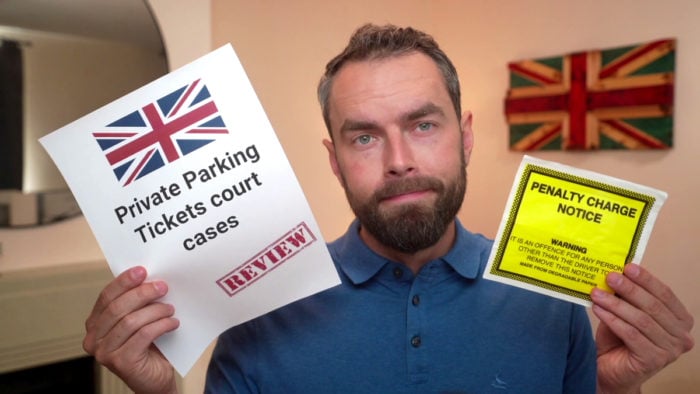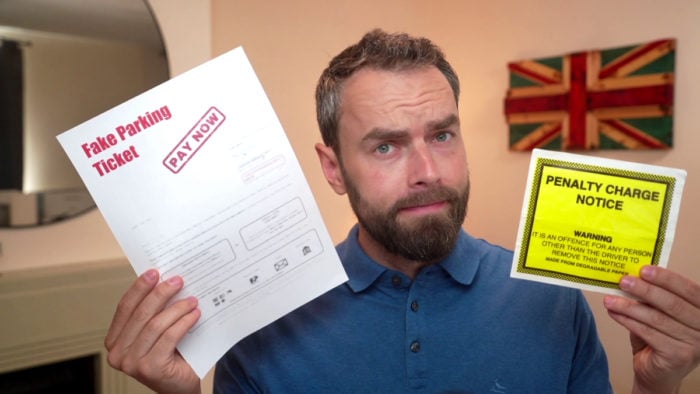Definition of a Parked Car? UK Laws

Wondering about the rules for a parked car in the UK? You’re in the right place. Every month, over 130,000 people visit our website seeking advice on fines and parking tickets.
In this article, we’ll help you understand:
- The real meaning of a ‘parked car’ in the UK
- Whether you can get a ticket while sitting in your parked car
- How parking is different from stopping
- The Traffic Management Act 2004 and its relation to parking
- How to appeal a parking ticket if you think it’s not fair
Unfortunately, getting a parking ticket is very common. In fact, over 19,000 parking fines are issued each day in the UK.1 So, you’re not alone.
We know it can be confusing and stressful. But don’t worry, we’re here to help you understand the rules and make sure you don’t pay a fine that you shouldn’t.
Most Ticket Appeals Succeed
In some circumstances, you might have a legitimate reason not to pay your parking fine.
It’s a bit sneaky, but the last time I needed legal advice, I paid £5 for a trial to chat with an online solicitor called JustAnswer.
Not only did I save £50 on solicitor fees, I also won my case and didn’t have to pay my £271 fine.
Chat below to get started with JustAnswer
*According to Martin Lewis, 56% of people who try to appeal their ticket are successful and get the charge overturned, so it’s well worth a try.
What’s the definition of a Parked Car in the UK?
Parked means that a vehicle is standing still for a short space of time and not to load or unload goods or pick up or drop off passengers, whether it is occupied or not.
Therefore, even if you stop for less than 5 minutes for any other reason, your vehicle will be regarded as “parked” rather than “stopped.”
This is also true if you wait in your car for any reason, whether it is to answer a phone call, examine a map or GPS, or simply wait for someone else to get in.
Note: Your vehicle is neither “stationary” nor “parked” when waiting for a red light or stuck in traffic, that’s part of UK parking regulations.
» TAKE ACTION NOW: Get legal support from JustAnswer
What’s the difference between parking and stopping?
Understanding the distinction between “no stopping” and “no parking” can be a bit tricky.
Taking things in their literal sense is the most effective method to comprehend the distinction between parking and stopping.
No stopping means it is not allowed, not even to drop someone off when you see there is a “no stopping” or “clearway” sign.
A “no waiting” or “no parking” sign permits a driver to stop briefly, perhaps to let out a passenger or unload some goods.
But you cannot stay there for an extended period of time.
You cannot wait there during the periods indicated on a “no waiting” sign with a single yellow line.
Unless there are exceptions noted on surrounding signs, “no waiting” with double yellow lines signifies neither waiting nor parking at any time.
Understanding traffic signs could reduce the risk of committing a parking violation.
Can you get a fine if you’re sitting in your parked car?
Yes.
Parked car laws UK stipulate that if you are parked somewhere you shouldn’t be, or you’ve stopped for more than 5 minutes without unloading or loading, a traffic warden could perceive this as a parked car – even if you’re sitting inside!
The warden can issue you a ticket because you failed to abide by parking rules and regulations.
But, they may first ask you to move your car beforehand. However, this isn’t always the case.
Successful Appeal Case Study
Situation
| Initial Fine | £100 |
| Additional Fees | £171 |
| Total Fine | £271 |
The Appeal Process
Scott used JustAnswer, online legal service to enhance his appeal. The trial of this cost him just £5.
| Total Fine | £271 |
| Cost of legal advice | £5 |
JustAnswer helped Scott craft the best appeal possible and he was able to win his case.
Scott’s fine was cancelled and he only paid £5 for the legal help.
In partnership with Just Answer.
Parking Ticket Actions
To understand the implications of this legal transition, let’s delve into the differences between Fixed Penalty Notices (FPNs) and Penalty Charge Notices (PCNs).
The table below outlines their causes, consequences, appeal process, and costs. If you want to learn more about PCNs, be sure to read our specialized guide.
| Category | Fixed Penalty Notice (FPN) | Penalty Charge Notice (PCN) |
|---|---|---|
| Original Cause of the Fine | Criminal Offenses – Issued by Law Enforcement Agencies for minor crimes. | Civil Offenses – Issued by Local Authorities for parking and traffic issues. |
| Consequences | You will receive a fine and may also receive points on your license if it is a driving offence. | You will receive a fine for a PCN – you cannot receive points on your license, or a criminal charge. |
| Failure to Pay | Further action will be taken against you. This could result in you being prosecuted, and it will be taken to court. This will most likely lead to a huge amount of extra costs. | The cost will increase by 50% if you don’t pay the amount on time, negatively impacting your credit score. If you continue not to pay, this could lead to bailiffs and court visits. |
| Appeal Process | There is no official appeal process for an FPN – instead, you will need to let the issuer know that you would like a court hearing instead. | You will have 28 days to make a formal challenge against the PCN. You must provide evidence of why you dispute it. You can find free letter templates to help you draft this appeal. |
| Costs | The fine will either be £50, £100, £200, or £300. The cost will depend on the severity of the situation. | The fine will typically be between £70 and £130. However, this may vary depending on the severity and the area you were fined in. |
Can you stop at a single yellow line?
When you see a single yellow line, that means you can’t stop, park, or wait there before or after the designated times.
There are no set times or rules.
In short, we suggest you always check the parking restrictions and yellow line rules before stopping or leaving your vehicle.
Join thousands of others who got legal help for a £5 trial
Getting the support of a Solicitor can take a huge weight off your mind.
Reviews shown are for JustAnswer.
Can you stop in a controlled zone?
Not necessarily.
We suggest you check out the signage before stopping or parking in a controlled zone. The same applies to:
- Resident Parking Zones, and
- Pedestrian Zones
- Yellow lines
- Double yellow lines
You risk being fined if you don’t follow the rules for stopping and parking in these zones.
Can you stop on double yellow lines?
When there are two yellow lines next to each other, it’s best to assume you can’t park there at any time.
There are strict parking rules on double yellow lines.
But, there are a few notable exceptions.
- You might be able to stop quickly if you need to load or unload something heavy.
- If you have a Blue Badge, you are permitted to park on single or double yellow lines for up to three hours as long as your badge is visibly displayed.
However, these exclusions won’t always be the case, so look for neighbourhood signs or curb edge markings.
Keep in mind that if there are two parallel yellow lines that are short and go over the edge of the kerb, you are not permitted to load at any time.
You are not permitted to park in any area where there are loading restrictions, even if you have a Blue Badge.
Can you be fined for parking in an electric car space?
Yes. You risk being fined if you park in a space reserved for EVs and not charging your vehicle.
EV parking laws UK are strict and must be followed to avoid being fined.
What is the law on parking on private land?
Getting a parking ticket on private land is a civil matter. You’d get a ticket for non-compliance with an operator’s T&Cs namely private land parking rules.
However, there are exceptions, for instance, parking on private land for criminal purposes.
It includes blocking the way to prevent the pursuit of a get-away vehicle following a robbery.
What is the Traffic Management Act 2004?
The Traffic Management Act 2004 decriminalised parking offences.
Parking fines fall under civil law thanks to the Civil Parking Enforcement (CPE) legislation.
What can you do if you feel the parking ticket was unfair?
There are, of course, some clauses when it comes to defining a “parked” car.
If you weren’t parked or believe the ticket was unfair, you may be able to make a parking ticket appeal UK.
Janine, our financial expert, advises to formally appeal a parking ticket within 28 days of receipt, providing evidence such as a photo of your car’s registration number if the PCN is incorrect.
People often think parking tickets are unfair because they didn’t think they were parked.
Here are several examples:
- Ambulances stopped to attend a call and you’ve pulled over to make way
- You’ve pulled over to take a phone call
- You were dropping off passengers at the train station or airport
- You’d briefly stopped to read the parking sign
- You were unable to move quickly enough to get out of the car park
Hire a Parking Solicitor for less than a coffee.
If you’re thinking about appealing your parking ticket then getting some professional advice is a good idea.
Getting the support of a Solicitor can make your appeal much more likely to win.
For a £5 trial, Solicitors from JustAnswer can look at your case and help you create an airtight appeal.
Try it below
In partnership with Just Answer.



